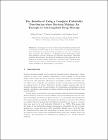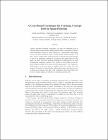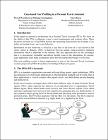Browsing Computer Science Technical Reports by Title
Now showing items 27-46 of 280
-
BeanBag: An Extensible Framework for Describing, Storing and Querying Components
(Trinity College Dublin. Department of Computer Science, 1999-09)When it became obvious that Object Oriented software applications were falling short of their promise of significant software reuse, the software industry began to look at another solution. Hence the interest in Component ... -
The Benefits of Using a Complete Probability Distribution when Decision Making: An Example in Anticoagulant Drug Therapy
(Trinity College Dublin, Department of Computer Science, 2005-08-06)In this paper we aim to show how probabilistic prediction of a continuous variable could be more beneficial to a medical practitioner than classification or numeric/point prediction of the same variable in many scenarios. ... -
The Best Way to Instil Confidence is by Being Right An Evaluation of the Effectiveness of Case-Based Explanations in providing User Confidence
(Trinity College Dublin, Department of Computer Science, 2005-02-07)Instilling confidence in the abilities of machine learning systems in end-users is seen as critical to their success in real world problems. One way in which this can be achieved is by providing users with interpretable ... -
Bezier Curves for Camera Motion
(Trinity College Dublin, Department of Computer Science, 1994-12)This paper describes an attempt to address some of the deficiencies and infelicities associated with the use of piecewise Bezier segments when constructing a smooth path for a camera in a computer animation. In particular, ... -
Blame-Based Noise Reduction: An Alternative Perspective on Noise Reduction for Lazy Learning
(Trinity College Dublin, Department of Computer Science, 2005-02-22)In this paper we present a new perspective on noise reduction for nearest-neighbour classifiers. Classic noise reduction algorithms such as Repeated Edited Nearest Neighbour remove cases from the training set if they are ... -
Bridging Bonobo Components
(Trinity College (Dublin, Ireland). School of Computer Science & Statistics, 2001-09)To manage the increasing complexity of software, many modern and large applications make use of components. GNOME, the free desktop environment for UNIX like systems, has created its own component model, namely Bonobo. The ... -
Building the next generation groupware: A survey of groupware and its impact on the virtual enterprise
(Trinity College Dublin, Department of Computer Science, 1999-02)[Executive Summary] This document explores the issues in building the ?groupware of the future?. The approach is twofold. First we briefly describe our vision of a ?virtual enterprise? that is made up of a set of services ... -
C** Programmers' Guide
(Trinity College Dublin, Department of Computer Science, 1992-02)The C** extensions to C++ for distributed and persistent programming in C++ are described. -
Calibrating Probability Density Forecasts with Multi-objective Search
(Trinity College Dublin, Department of Computer Science, 2006-02-10)In this paper, we show that the optimization of density forecasting models for regression in machine learning can be formulated as a multi-objective problem.We describe the two objectives of sharpness and calibration and ... -
Call Admission Control and Dynamic Pricing in a GSM/GPRS Cellular Network
(Trinity College (Dublin, Ireland). School of Computer Science & Statistics, 2004-09)In the past decade, the wireless communications market has experienced tremendous growth, and this growth is likely to continue in the near future. In addition to an increase in the number of users, ever more demanding ... -
CapaFS: A globally Accessible File System
(Trinity College Dublin. Department of Computer Science, 1999-09)We have designed and implemented a reference implementation of CapaFS, a global, decentralised file system that allows users to collaborate with other users anywhere in the world, with no prior arrangements or connections. ... -
Case Representation Issues for Case-Based Reasoning from Ensemble Research
(Trinity College Dublin, Department of Computer Science, 2001-03)Ensembles of classifiers will produce lower errors than the member classifiers if there is diversity in the ensemble. One means of producing this diversity in nearest neighbour classifiers is to base the member classifiers ... -
A Case-Based Explanation System for `Black-Box? Systems
(Trinity College Dublin, Department of Computer Science, 2004-06-23)Most users of machine-learning products are reluctant to use the systems without any sense of the underlying logic that has led to the system?s predictions. Unfortunately many of these systems lack any transparency in the ... -
A Case-Based Personal Travel Assistant for Elaborating User Requirements and Assessing Offers
(Trinity College Dublin, Department of Computer Science, 2002-04)This paper describes a case-based approach to user profiling in a Personal Travel assistant (based on the 1998 FIPA Travel Scenario). The ap-proach is novel in that the user profile is made up of a set of cases capturing ... -
Case-Based Plan Recognition in Computer Games
(Trinity College Dublin, Department of Computer Science, 2003)In this paper we explore the use of case-based plan recognition to predict a player?s actions in a computer game. The game we work with is the classic Space Invaders game and we show that case-based plan recognition ... -
Case-Based Reasoning in Scheduling: Reusing Solution Components
(Trinity College Dublin, Department of Computer Science, 1996-08)In this paper we explore the reuse of components of known good schedules in new scheduling problems. This involves accumulating a case-base of good quality schedules, retrieving a case (or cases) similar to a new scheduling ... -
A Case-Based Reasoning View of Automated Collaborative Filtering
(Trinity College Dublin, Department of Computer Science, 2001-03)From some perspectives Automated Collaborative Filtering (ACF) appears quite similar to Case-Based Reasoning (CBR). It works on data organised around users and assets that might be considered case descriptions. In addition, ... -
A Case-Based Technique for Tracking Concept Drift in Spam Filtering
(Trinity College Dublin, Department of Computer Science, 2004-08-17)Clearly, machine learning techiques can play an important role in filtering spam email because ample training data is available to build a robust classifier. However, spam filtering is a particularly challenging task as ... -
Case-Based Travel Agent
(Trinity College (Dublin, Ireland). School of Computer Science & Statistics, 1999-09)With the explosion of the Internet, we are getting more and more information and it becomes difficult to digest. Agents exist to help the users. An agent is a component of software (or hardware) that is capable of ... -
Case-based User Profiling in a Personal Travel Assistant
(Trinity College Dublin, Department of Computer Science, 1999-03)[Introduction] In this paper we present an architecture for a Personal Travel Assistant (PTA). We focus on the ability of this PTA to elaborate a user?s travel requirements and evaluate offers. These decisions are based ...























